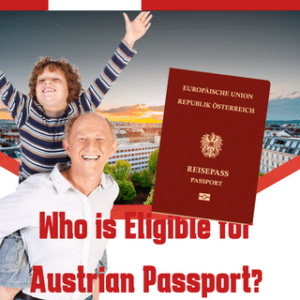Who is Eligible for an Austrian Passport? (✔️ Updated Guide for 2024)
Against the backdrop of a reform in Austrian citizenship law enacted in 2020, the population eligible for Austrian citizenship has significantly expanded. Consequently, there has been a noticeable increase in the number of people seeking Austrian citizenship. Who is eligible for an Austrian passport?
How to obtain an Austrian passport? Who in the family is entitled to an Austrian passport? Who is disqualified from obtaining an Austrian passport? And how can one obtain an Austrian passport? An immigration attorney will explain whether and how you and your family members can obtain an EU Austrian passport.
What Austrian Citizenship Law Specifies:
In October 2019, the Austrian government enacted an amendment to the Austrian Citizenship Law, which came into effect in September 2020. The updated law introduced numerous significant changes, expanding the list of eligible individuals and simplifying the conditions for obtaining Austrian citizenship and passports.
The current version of the law applies to Jews who were forced to leave Austria due to Nazi persecution starting from January 1, 1933 and until May 15, 1955.
This law allows these Jews and their descendants to apply for citizenship. Importantly, eligibility is not limited to those who were Austrian citizens but may also apply to those citizens of the Austro-Hungarian empire who lived in Austria before being forced to flee it.
Simplified Conditions under the Austrian Citizenship Law Reform:
The law has also removed restrictions on Austrian citizenship applicants. For example, the restriction on applicants who underwent voluntary military service in the past no longer applies. Additionally, gender-based discrimination, which previously prevented many female Holocaust survivor descendants from obtaining Austrian citizenship, has been eliminated.
Beyond these changes, the law has significantly streamlined the citizenship process by abolishing language and culture tests that were previously in place and used to assess citizenship applicants.
Why It’s Recommended to Consult an Immigration Lawyer in the Process:
The process of obtaining Austrian citizenship can be complex and lengthy. Since the amendment of the Austrian Citizenship Law in 2020, there has been a notable increase in citizenship applications processed by Austrian authorities. Consequently, bureaucratic hurdles may arise, potentially delaying or complicating the process.
Protracted processing times may lead to the discovery of deficiencies in applications, missing documents, or insufficient grounds for rejection, but only after a significant period has passed. An immigration lawyer specializing in Austrian citizenship can assist in obtaining the necessary documentation for citizenship applications, maintaining communication with authorities and archives in Austria if needed, or consulting qualified genealogists.

Advantages of Holding an Austrian Passport:
According to passport rankings in recent years, an Austrian passport ranks among the top ten most powerful passports globally. As of 2023, Austrian passport holders can enter 192 countries without the need for a visa, including Australia.
Austria is a member of the European Union and the European Economic Area (EEA). Consequently, holding an Austrian passport allows for seamless travel without a visa requirement to most European countries, including non-EU nations like Switzerland and the United Kingdom.
Moreover, an Austrian passport enables residence, business activities, and access to economic and social benefits (such as opening a European bank account, pursuing academic studies, and healthcare) across all EU member states without restrictions.
Who is eligible for an Austrian passport?
During World War II (between 1938 and 1945), approximately 126,500 Jews left the territory of the Republic of Austria. These Jews emigrated to various countries around the world. Tens of thousands of them, who fled to different countries in Europe occupied by the Nazis, were sent to concentration camps, and nearly 13,000 of them were killed by the Nazi regime.
All former citizens of the Republic of Austria, whether they survived or not, may be eligible for Austrian citizenship that can also be passed on to their descendants.
If you or your ancestors, grandparents, or even great-grandparents were former Austrian citizens, it is possible that you are eligible to go through the naturalization process under the new law, whether you live in Israel or elsewhere.
The intergenerational connection to former Austrian citizens does not have to be direct. Even if only one of your parents, grandparents, or great-grandparents was an Austrian citizen or was eligible for Austrian citizenship that was revoked due to Nazi persecution, and your parents never obtained Austrian citizenship themselves, you may be eligible for Austrian citizenship.
Are the children of Austrian citizens eligible for an Austrian passport?
Yes. Eligibility for citizenship under the Austrian Nationality Act passes from generation to generation. Therefore, those who acquired Austrian citizenship through naturalization processes can also apply for naturalization for their children and grandchildren, and likewise, their children can apply for it themselves.
The process in these cases will be simpler because the theoretical eligibility of the children has already been proven through the documents submitted by their parents.
For those whose children were born after their parents had already acquired Austrian citizenship, they can register their children in Austria’s population register, automatically granting them citizenship.
Are spouses of Austrian citizens eligible for an Austrian passport?
Eligibility for citizenship does not automatically transfer to spouses of Austrian citizens, but there is an option for spouses to acquire status in Austria under certain circumstances.
Spouses or partners of Austrian citizens who have been married for five years or more may be eligible for Austrian citizenship, provided they have lived in Austria for at least six years in a common household with the Austrian citizen..
How can people with no family ties to Austrian citizens obtain an Austrian passport?
In addition to the possibility of obtaining citizenship based on persecution by the Nazis or direct family ties to persecuted Austrian citizens, there are other pathways to obtaining Austrian citizenship.
For example, in cases of citizenship based on investment, prolonged residence in Austria, or obtaining a professor’s degree from an Austrian institution of higher education.
Furthermore, former Austrian citizens who lost their citizenship can reacquire Austrian citizenship as long as they have not renounced it, and citizenship has not been revoked. However, they must provide evidence that they have lived in Austria for at least one year before being eligible for citizenship.
Who is not eligible for an Austrian passport?
There are cases in which individuals who meet some of the eligibility criteria for Austrian citizenship may not be granted Austrian citizenship and an Austrian passport:
Conviction of serious criminal offenses
Conviction of serious criminal offenses, including significant economic crimes, involvement in terrorist activities, or an actual attempt to undermine Austrian democracy, may result in the denial of Austrian citizenship, even if you are eligible for citizenship based on being descendants of Austrian citizens.
Serving in voluntary foreign military service
Individuals serving on a voluntary \ career capacity in the Israel Defense Forces (IDF) or in another foreign army will not be able to apply for naturalization as long as they are serving in a permanent capacity or volunteering. Additionally, future service in a foreign army by an Austrian citizen may lead to the revocation of citizenship.
An experienced immigration attorney can help you avoid unpleasant situations and even sanctions, such as fines or citizenship revocation, due to failure to report or disclose dual citizenship.
What documents need to be prepared to apply for an Austrian passport?
- Birth certificate
- Name change certificates
- Certificate indicating any other citizenship held by the applicants
- Extended registration extract
- Information about military service
- Documents proving the direct family relationship between the applicants and their ancestors
- Documents showing the place of residence of the applicants’ ancestors during the relevant years
- Documents proving that the applicants’ ancestors were persecuted by the Nazis
- Any other documents that may be required depending on specific circumstances
It is important to note that you will be required to translate documents not written in German using a certified translation, and you will also need to pay various fees, such as those for passport issuance.
How can an immigration attorney with experience in Austrian immigration laws help you obtain an Austrian passport?
In conclusion, if you are descendants of Austrian citizens or residents, you may be eligible for an Austrian passport, along with many benefits across the European Union.
An immigration attorney with experience in Austrian immigration and citizenship can assist you in finding the right documents, completing the complex application process, communicating with Austrian authorities, and handling all the necessary bureaucracy. They will be with you throughout the journey to Austrian citizenship.
מאמרים מומלצים



